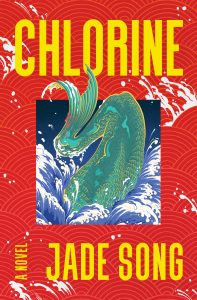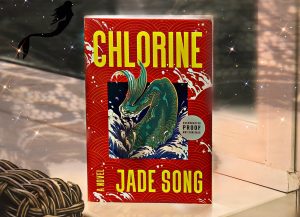CHLORINE by Jade Song (BOOK REVIEW)
“Mermaids are not born. We are made.
I burst into being when I was seventeen years old. I became a mermaid not as a pearl in a clamshell, but as a girl in a locker room”
Chlorine by Jade Song is a coming of age, body horror debut which is as unnerving as it is poignantly tender. This is a thought-provoking, powerfully written novel which sent shivers down my spine.
The novel follows Ren Yu, the daughter of Chinese immigrant parents, through her adolescence as she trains to become a competitive swimmer. Ren never feels like she fits in amongst her American peers, their music tastes are not hers, she doesn’t look like they do, but their life seems mundane from her perspective. The only place Ren ever finds sanctuary is when she’s in the water, where her body can finally be free and weightless. Ren goes through ordinary teenage experiences such as her first period, her first friend, her first boyfriend and exploring her sexuality. Yet Ren knows deep in her soul that she is far from ordinary, she knows she’s not even human, she’s destined to transcend into a mermaid.
 Through reflective first person narration, Song chronicles Ren’s life in vivid detail using concise sharp prose to provoke disquieting imagery, slowly building up our own sense of unease. This unease first begins when we see how hands on and how strict Ren’s swimming coach, Jim, is. Oh he never goes beyond what would be considered as abuse, and at the time Ren sees the attention he gives her as shaping her to become a talented swimmer, but through adult eyes his behaviour is certainly questionable. Song also doesn’t shy away from vividly reflecting upon the journey Ren’s body goes through in adolescence. From Ren’s first period we witness in great detail her struggles with the pain and awkwardness of inserting tampons. Song doesn’t hold back in her descriptions either as she openly portrays the blood loss. Seriously, men should read this and have their eyes fully opened.
Through reflective first person narration, Song chronicles Ren’s life in vivid detail using concise sharp prose to provoke disquieting imagery, slowly building up our own sense of unease. This unease first begins when we see how hands on and how strict Ren’s swimming coach, Jim, is. Oh he never goes beyond what would be considered as abuse, and at the time Ren sees the attention he gives her as shaping her to become a talented swimmer, but through adult eyes his behaviour is certainly questionable. Song also doesn’t shy away from vividly reflecting upon the journey Ren’s body goes through in adolescence. From Ren’s first period we witness in great detail her struggles with the pain and awkwardness of inserting tampons. Song doesn’t hold back in her descriptions either as she openly portrays the blood loss. Seriously, men should read this and have their eyes fully opened.
Major themes which Song explores are identity, peer pressure and how culture plays a significant part. For example Ren idolises Faye Wong, her and her mother’s favourite Hong Kong musician and actress, yet her swim team friends like Bon Jovi and Journey, therefore Ren’s passions are lost on them. In the midst of hormones and trying to fit in, Ren’s life is filled with a lot of toxic damaging experiences. Yet there is some light, in the form of a red haired girl called Cathy. Their blossoming friendship and their sapphic longing is raw and turbulent, but holds such sweet moments. Though even Cathy cannot hold the darkness at bay and as the pressures rise from her swimming coach and from her mother, when she cannot meet their expectations and ultimately begins to fail, we see the toll it takes on Ren’s mental health. The way Ren copes with life, the way she’s always coped really, is to only visualise succeeding in her studies and swimming meets as ‘human’ tasks which will eventually fulfil her goal to becoming a true body of the water.
“Humans are the downfall to myths. Whether the human razed the home, broke the heart, or betrayed the trust, the mythical is always in a worse state after the introduction. I read countless stories of mermaids dragged forcibly from their oceans, mermaids condemned to marriages with men, mermaids stricken with voiceless throats. My ancestors’ lessons forewarned me to close my heart to human advances.
But I was so lonely.”
I mentioned earlier how Song reflects upon Ren’s bodily changes as she grows up but in fact her body transforms in others ways too as she becomes shaped to be streamline in the water. Jim insists that his students must eat a certain diet, consume a certain amount of calories, build muscles in the right places, and never, ever, miss training. Ren’s life becomes regimented, controlled and disciplined. Song draws upon her own experiences as a professional swimmer and illustrates how it is a life that can be both rewarding but also taxing. Yet it has been Ren’s lifelong passion to be in the water, which stemmed from her childhood obsession with Mermaids. Song makes clear how the representation of mermaids from all cultures and mediums from Disney, to Hans Christian Andersen and even Chinese depictions were sexist as the mermaid’s purpose was to change for men. Ren’s ideology of a mermaid is one that differs, in her mind they are fierce, powerful, monsters to some but ultimately at peace with themselves. If that means Ren has to endure ‘human’ pain to gain her transcendence, if she too has to become a monster, then so be it. When we begin to descend towards the novel’s climax things take a dark and rather disturbing turn. Song juxtaposes what Ren sees as natural and beautiful with stark, brutal horror.
“Humans and monsters both understand stories about magic and marvel and myth are made interesting by their stemming from trauma and violence and blood. How can one grow without pain?”
Though Song leaves much to the reader’s imagination, I personally saw this novel as a tender story of a lonely outcast girl who just wanted to transcend into a body which revelled in power not pain. I absolutely loved the way the ending leaves the reader to decide Ren’s fate. Was she finally free?
ARC provided by Kelly at William Morrow in exchange for an honest review. Thank you for the copy! All quotes used are taken from an early ARC and are subject to change upon publication.
Chlorine will be released 28th March but you can pre-order your copy from:

